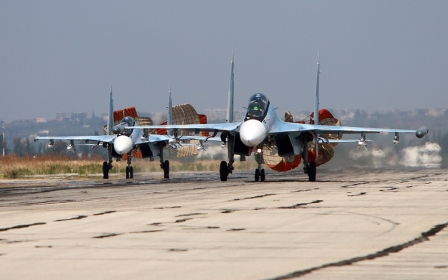Western firms sell drones, surveillance and riot solutions to Gulf tyrants for 'homeland security'

Drones, surveillance technologies and riot control gear were among the top products showcased by giant Western defence contractors at a recent major arms fair in Abu Dhabi, the United Arab Emirates.
Apparently this is how the Free World brings democracy to those backward Muslims in the Middle East: with guns.
The 2016 International Exhibition for National Security and Resilience (INSR) in March hosted over 500 exhibitors from the worldwide defence industry, including Britain's BAE Systems, US military firm Dyncorp, L-3 Communications, a Canadian aerospace and defence company; Japanese ICT firm, NEC Global; Thales, the French electronic systems defence contractor; and Beretta, the well-known Italian firearms manufacturer.
Thales displayed its new “Spy Ranger” drone at the fair, which the French firm describes as a latest-generation “surveillance and reconnaissance mini-drone”.
The mini-drone is especially designed for “border surveillance” and “homeland security” missions, as well as for “critical and vital interest infrastructure surveillance” encompassing “transport, oil and gas, energy,” according to an ISNR newsletter distributed at the event.
Another firm, Italy's 037SMIT, exhibited an “intelligence robotic vehicle” called the Black Guardian, which functions as a surveillance command and control hub.
The robot is being used by UAE security contractor Falcon Eye Technology to create a Big Brother surveillance network involving “pedestrian radars, thermal radars, night vision, facial recognition” among other functions.
At a special seminar, BAE Systems showcased its new Advanced Threat Intelligence cybersecurity system, capable of automatically monitoring, processing and analysing a massive amount of online network metadata to detect threats.
Other US exhibitors included Skyline USA Inc., which provides stun guns, pepper sprays and police tactical batons; and Aventura, a contractor for the US Department of Homeland Security supplying surveillance technologies for domestic law-enforcement and border control.
Aventura will also be exhibiting at next week’s Saudi Safety & Security arms fair in Damman, Saudi Arabia.
Also on display was a state-of-the-art anti-riot water cannon produced by China North Industries Corporation for the Chinese Army.
The cannon, according to the ISNR document, can “effectively disperse a riot crowd,” easily mixes tear gas with water or dye, and is able to run for several hours at a time.
“To avoid rioters getting close to the vehicle, nozzles are mounted at the top of the sides of the vehicle to spray gas or dye,” the ISNR newsletter gushes.
How handy.
The ISNR’s Future of Policing pavilion was a new addition to the arms fair, which has taken place annually for the last seven years. The pavilion exhibited a range of advanced law enforcement solutions including what ISNR’s organisers described as “connected police, robots and drones, and crowd control”.
One of the exhibitors was Martin Johns, a 14-year British Army veteran who is now head of business development at Passive Force LLC, whose flagship product, STORM500, is “an integrated, non-lethal crowd control solution”.
“Passive Force excels at addressing these changing dynamics facing governing bodies, security services and domestic law enforcement agencies, as they confront a multitude of challenges in highly complex situations,” enthuses the company website.
Of course, by “multitude of challenges,” the good folks at Passive Force basically mean angry Arab hordes who dare to challenge authoritarian "rule by torture" in multiple Gulf dictatorships.
How dare those pesky populations aspire to replacing the Free World’s moderate Gulf allies with their own democracies?
Mark Whyte, senior managing director of British private intelligence firm, Control Risks Group (CRG), is usefully quoted in the ISNR newsletter explaining that actually it’s nothing to do with democracy. Rather, he said, “the threat of protest and violent disorder, which can cause a significant impact on business operations, continues”.
Democracy isn’t good for business. At least not in the Middle East.
Another major driver of regional instability is an increase in the frequency and impact of natural disasters, according to the ISNR document. Since the 1980s, the average number of natural disasters in the Middle East and North Africa (MENA) has tripled, while only doubling elsewhere.
This is a boon for disaster capitalists. Frost & Sullivan, the global financial consultancy, forecasts that the global emergency response market will rise from $50.4 billion in 2012 to $131.6 billion in 2019.
The Middle East homeland security market is especially expected to grow exponentially over the next five years.
Major General Ahmed Nasser al-Raisi, deputy chairman of ISNR’s organising team, said: “The Middle East’s homeland security market will see a compound annual growth rate of 18.7 percent and reaching $34 billion per year by 2020, a growth rate that is three times higher than the global average.”
He also claimed: “This growth is not reflective of worsening security situations, but rather a positive foundation for countries enhancing their security and resilience.”
Of course. More guns equals more security.
Somehow, I don’t think most Arab citizens being kept "safe" by their burgeoning "homeland security" kingdoms would agree.
But that’s ok. A good non-lethal beating will probably convince them.
- Nafeez Ahmed PhD is an investigative journalist, international security scholar and bestselling author who tracks what he calls the 'crisis of civilization.' He is a winner of the Project Censored Award for Outstanding Investigative Journalism for his Guardian reporting on the intersection of global ecological, energy and economic crises with regional geopolitics and conflicts. He has also written for The Independent, Sydney Morning Herald, The Age, The Scotsman, Foreign Policy, The Atlantic, Quartz, Prospect, New Statesman, Le Monde diplomatique, New Internationalist. His work on the root causes and covert operations linked to international terrorism officially contributed to the 9/11 Commission and the 7/7 Coroner’s Inquest.
The views expressed in this article belong to the author and do not necessarily reflect the editorial policy of Middle East Eye.
Photo: People walk around as they visit the opening of the International Defence Exhibition and Conference (IDEX) at the Abu Dhabi National Exhibition Centre in the Emirati capital on 17 February, 2013 (AFP).
New MEE newsletter: Jerusalem Dispatch
Sign up to get the latest insights and analysis on Israel-Palestine, alongside Turkey Unpacked and other MEE newsletters
Middle East Eye delivers independent and unrivalled coverage and analysis of the Middle East, North Africa and beyond. To learn more about republishing this content and the associated fees, please fill out this form. More about MEE can be found here.





